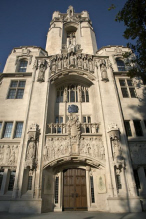Supreme Court to hear appeal by council on compensation after pier closure
 The Supreme Court will next week (23 June) hear a borough council’s appeal over an order that it should pay more than £2m in compensation plus legal costs to the operators of a business on a seaside pier it temporarily shut down.
The Supreme Court will next week (23 June) hear a borough council’s appeal over an order that it should pay more than £2m in compensation plus legal costs to the operators of a business on a seaside pier it temporarily shut down.
The case of Hastings Borough Council v Manolete Partners Plc (Case ID: UKSC 2014/0159) centres on the decision by the local authority between 16 June and 12 September 2006 to close Hastings Pier to the public in the exercise of its powers under section 78 of the Building Act 1984. This was amid concerns over health and safety.
The claimant (Manolete), as assignee of one of the tenants operating businesses on the pier (Stylus Sports), claimed compensation for loss of profits during that period under section 106 of the 1984 Act. Stylus had let two units on the pier; a bingo hall and an amusement arcade.
Hastings BC defended the claim on the basis that the tenant was "in default" within section 106.
In the High Court Mr Justice Ramsey rejected that defence and upheld Manolete's claim for compensation. The judge said that Ravenclaw, the owner of the pier, had been at fault, not Stylus. The latter had attempted to force Ravenclaw, a Panamanian-registered company, to carry out remedial repairs or meet the cost of them but had been unsuccessful.
In May 2014 the Court of Appeal dismissed the borough council’s appeal. (Click here for a fuller report on the Court's decision and more information on the factual background of the case)
Lord Justice Jackson, with whom Lord Justice Aikens and Lord Justice Patten agreed, said: “The tenant had no responsibility for the structure of the pier and was not responsible for the defects which had developed. The proposition that the tenant would be in breach of the Occupiers' Liability Act 1957 or the Heath and Safety at Work Act 1974 by admitting the public onto its business premises does not constitute a defence to the claim under section 106 of the 1984 Act. Likewise the council cannot rely upon those matters as the basis of a defence of ex turpi causa.”
At issue before the Supreme Court will be the meaning of "in default" in s.106 of the 1984 Act in the context of an exercise of a local authority's power under s.78 of that Act.
A five-justice panel – comprising Lady Hale, Lord Kerr, Lord Carnwath, Lord Toulson and Lord Hodge – will hear the case on 23 June.
